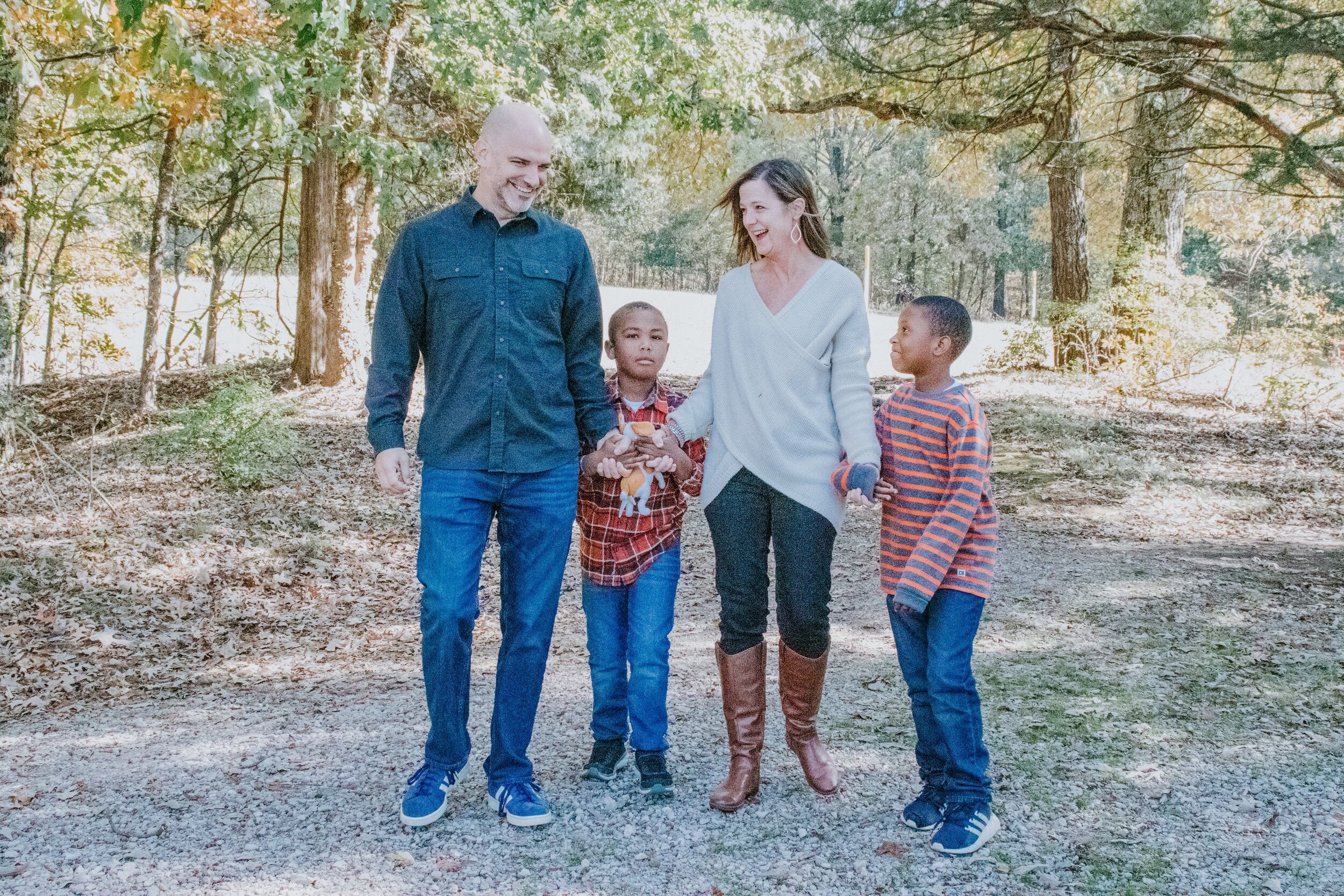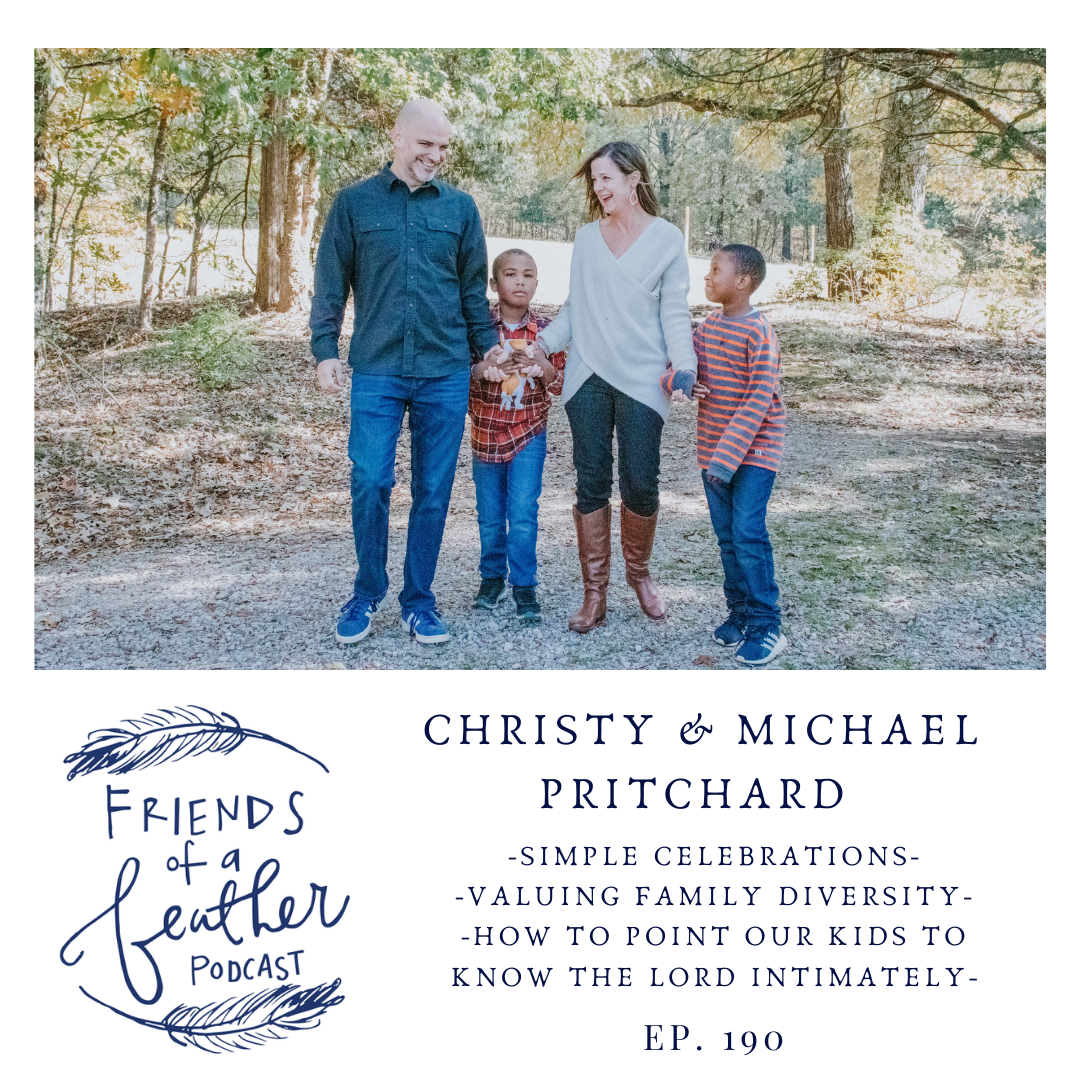Recently I had the honor (and fun!) of interviewing Michael and Christy Pritchard, who have a weekly podcast called Diapers to Diplomas. They share the adventures of their transracial, adopted, special needs family to share hope for your own parenting journey and help you to lead your family well.
This interview has been edited for clarity and length. You will want to listen to the entire episode here!
You’re Not Alone on the Parenting Journey
WR - Okay, so let's, let's jump in. I want y'all to tell us ... how your family went from you two to four of you within weeks? How did that happen?
Christy - Well, you and I met when we were on the journey of infertility. We had just walked through a miscarriage, and were told that it should be no problem for us to get pregnant again. But as you know, it was a challenge. And it was a problem. And so after about a year of infertility, we felt like God was giving us the green light to pursue adoption. Now, if you know anything about that process, it can take anywhere from one year to five years, so we were really kind of on that timeframe. And the agency we were working with had said we would probably get be a newborn. We were both on staff at the church, in the midst of summer, being on the student ministry staff, which is always busy. And then this phone call came after we were only about five, six months into the process.
Michael - Yeah. And I was preaching at a camp, Christy was at a local missions project. And they were like, “Hey, we might have a potential child for you. Would y'all be open to that”? We talked about it that weekend, and decided we were, and then we went off on another trip to DC. And right when we landed, we found out that there was one little boy who needed to be adopted. So Christy went home, quit her job, and we got ready in about a week or so. But it wasn't a newborn. It was a two-year-old. And then the day we were supposed to pick him up, we got a phone call, again from the adoption agency, and they said, “Hey, the birth mom just let us know that this little boy has a six-month-old younger brother, would you be willing to adopt him as well? And hey, we need to know in about an hour or so!” So it was kind of a crazy day. By the end of that day, however, the whole adoption had actually fallen apart. And so we started the day thinking we were going to get one child. By the middle of the day, we thought we were getting two, and by the end of the day, it was none.
Christy - But over the next two weeks, the Lord used several people to kind of iron out the things that were keeping us from bringing the boys home. So in about two and a half weeks, we were able to bring the boys home. So they are birth half brothers, and they came home on the same day. And we just celebrated nine years with them. And since then, our lives have never been quiet. We've never had a quiet day!
On discovering one of their children was on the spectrum
WR - Hmm. I love that you talk about the faithfulness of God and how as podcasters y'all are encouraging families in their walks with Jesus, but also in parenting. Parenting is hard. It's a hard spot to be in. And you mentioned the struggles that Daniel has had, can you tell me a little bit of how you knew that he was on the autism spectrum? You know, as adoptive parents, you're welcoming these boys into your family, and God is making y'all knit together as a family. And then you realize that there are a couple of different issues that he's struggling with. How did you know that there were some issues with Daniel?
Christy - Well, let me say, first of all, ironically, when we were going through the adoption process, the one thing we told the agency that we didn’t feel comfortable with was special needs. We said whatever age, whatever ethnic background, we thought we were totally open. But the one thing was we were not equipped for was special needs. But Daniel was six months old when he came home to us. And I think probably the first thing that we started noticing was the lack of verbal sounds. We didn't think a ton about it, because we never had an infant before, and so we didn't know the milestones yet. He was a little delayed in his crawling, a little delayed in his walking, and we started noticing delays in his fine motor skills and some of his larger motor skills. But the big thing was we just weren't getting any type of verbal sounds like a normal infant or toddler would give, except for screaming. He really had screaming down pat...
We didn’t get the official diagnosis until he was five years old. And I was really glad because I think sometimes we can kind of jump to conclusions too early on. And those therapists said let's wait before we take him to the psychologist. It wasn't until it was time for him to go to school and start kindergarten that we kind of pulled the trigger and ran some tests.
Michael - There were many days that we got to the end of the day, and we were just happy we made it to the end. Daniel may have screamed the whole time, Zachary might have been, you know, a typical four-year-old and dealing with all those issues. But there really were days that we just cried together, wept together, told each other how we truly felt, how painful it had been, how hard it had been, to help us stay connected. Because when you're sometimes on the receiving end of that amount of struggle, it can be really difficult for your relationship with your spouse. And so we had to work very hard over the years to make sure that we stayed connected to each other.
Christy - The statistics of marriages falling apart as a result of having a special needs child is really sad. To be honest with you, it does place a strain [on the marriage]...And, I would say there's a grieving process that has to occur. You have to grieve the dreams that you had for your child that you realize will never come to fruition. But the hope is that you come out on the other side of that grief process redefining those dreams, and realizing that just like for any other child, God has a purpose for them, that God can still impact His kingdom through the life of that child. And those special needs are not going to get in the way of God, He will actually use them.
On celebrating wins
Michael - Now are there days that you think “God, how in the world can you use these days?” Or, I'll speak for myself, I've been angry with the Lord, I have struggled with the Lord, I have cried before him. And I have wept and begged him to help my boy in certain ways. And the Lord hasn't done that as much as I would want him to do in certain aspects… But, you know, teaching Daniel sometimes is a little bit more of a challenge, yet we really try to celebrate any time he moves forward. anytime he hits a milestone or new word, we celebrate. We celebrate really big because we know that's how the father celebrates whenever we move forward. So we want to show that to him.
WR - Well, I love that you said the word “celebrate” because this also refers to something that y'all do as a family. There was an episode on your podcast recently, where y'all were celebrating a win. And so that's kind of like the phrase now: we celebrate the win. But what it is, is like that “inch stone”, the milestones that y'all can see in Daniel's life, or just in your family. I so love how you explained in that episode that wins are just whatever is moving your family forward. So I was picking my son up from school on Friday and I thought, we're gonna do that tonight. We're gonna have a “Celebrate Your Wins” party tonight. We're gonna go make brownies. Go get ice cream. Let's make it simple, but special. And when we came home, I told my son about it. And we just did it. It was the neatest thing. It was so good. We talked about our wins. So simple, but yet so impactful. We want to do it every Friday night.
Michael and Christy Pritchard live in Memphis, TN, with their two sons Zachary (11) and Daniel (9). Michael is a native Memphian while Christy claims small town South Mississippi as her roots. Between them, they have 29 years of ministry experience with all ages, ranging from young children to college students. They have ministered within the contexts of churches, university campuses, mission fields, camps, and retreats. By sharing authentic stories from their unique journey and offering practical next steps, Michael and Christy seek to remind parents they are not alone in their parenting journey.
On being a trans-racial family
Michael - You know, we've always known cultures are different - white culture, black culture, Hispanic culture - but we've never lived it. And so in the process of raising our boys, we began asking the question, “How do we see the world through their eyes instead of our own eyes?” And how do we need to interpret things, not from a white perspective, but from a black perspective, and one of our sons is half Hispanic, so from a Hispanic perspective. And that causes us to sometimes be a little uncomfortable. But we've come to realize that we need to look at that more, we need to understand that society may look a little bit different from someone else's perspective. And really learn to appreciate the differences in culture. Because there's value in that. We don't need to try and erase the history and backgrounds of another culture by saying, “Hey, I don't even see your color.” We're erasing so much of what is important to them, by doing that, because it's their history, it's their culture. And so we want to value that and recognize that in other people.
On raising “colorblind” children
Michael - You know, I think the best way to do that is [to establish] relationships with other families who look different from you. I think that is going to be one of the best ways to show your children and teach them to value other people who are different. Because we used to always think that kids are just colorblind. But studies have found that kids gravitate to other kids who look like them. So they still need those conversations, they still need teaching them to see that other races are just as valuable as their own. And that comes through relationships, through inviting a different family into your house or trying to connect with them in your neighborhood or at their school or things like that. Those relationships are such a key part.
Christy - I think that we, as parents come into it with a lot of baggage, because we've grown up with some events that maybe our children didn't witness, or conversation with our parents that that might have formed our thoughts. And we have to remember that our kids don't have baggage and so it's not a big deal for them to have these conversations. If you think about it, we have conversations with our children all the time about things that they don’t know. But because they trust us, they trust the conversation, and I think that's what makes race conversations so beautiful with children. Whatever mom and dad says they're like, “Oh, okay,” and the earlier you start the less awkward it is as they get older.
On encouraging moms “in the trenches”
Christy - I actually have two pieces of advice, both of which I did not do well in the early days, both of which I've so had to learn along the way. And the first one is to give yourself so much grace, and realize that the learning curve of parenthood is huge, no matter what you're walking through. You mentioned earlier, parenting is hard. it’s the hardest thing I have ever done in my life. Now don't get me wrong, it's also one of the most wonderful things. We also need to realize that ultimately - and this comes under the grace part - they are the Lord's children. Like, so many times, Michael would come home at the end of the day, and I'd be like, “I've messed them up. I've messed them up permanently. They're not going to get over this.” And every mom has felt that at least one day of her life...
The second thing I would say is to stay connected. You and I both know as a mother you are very focused on your children. And you can go 5,6,7 days, four weeks sometimes without talking to another friend. I'm constantly having to remind myself, even after nine years, to have girl time, have friend time, talk to somebody. Finding another girlfriend that has a situation like my own or your own might be hard sometimes. But you know what, it's okay. Just having friends that will listen to you and go, “Oh, yeah, I felt that. Oh, yeah, I get that.” Celebrate the wins with the ones that you can go off and go shopping with and have coffee with. Give yourself grace, stay connected with other girls. Those are my two things.
Final thoughts for dads
Michael - With dads, I think the big thing is to remember that you're part of a team, if you're married, and not to try and solve everything on your own. A big way of doing that is by letting your wife know what's going on inside of your mind. You know, we've had so many years of the messy middle. And I had to learn over time to let Christy in on when I was struggling with, what I was thinking about, when I was filled with despair or when I was filled with fear. And naturally, I wanted to keep all that to myself. That's how I started in our marriage. But I've learned over time that I need to let Chris be a part of that. And what that has done over the years is keep us connected. Because the best thing for children when the middle is messy is when their parents are solidly connected to each other. That's the best thing we can give our children.



